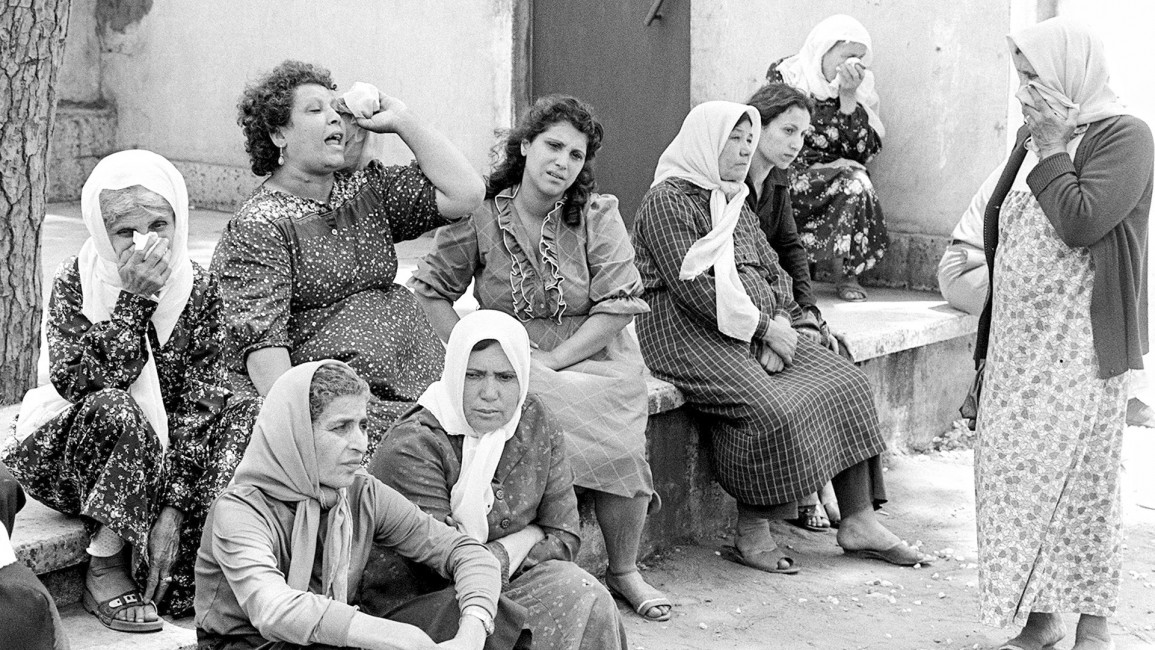
My mother’s bravery after Sabra and Shatila
Israel left nothing untouched in its siege of the city, it cut off water, electricity, food and fuel supplies. Some Beirutis escaped to the mountains, while others left the country. The Palestinians in the Sabra and Shatila refugee camps were left; faces and stomachs contorted from hunger and thirst.
At the time, being a Palestinian meant you were a terrorist in the eyes of the occupying soldiers. Many of these “terrorists” were not lucky enough to have left the two devastated camps before September. They became the heroes and victims of Sharon’s Sabra and Shatila massacre.
| |
My mother was very kind and very brave… the last to arrive at the bomb shelter and the first to leave |
It was 11:00am on 16 September 1982. Beirut was covered with smoke from the bombs. I remember the headlines of the newspaper my grandfather bought daily, warning that the worst was yet to come. “Nothing is greater than death”, said my mother. We lived just ten minutes away from the camp.
Everyday bravery
My mother was very kind and very brave at the same time. Throughout the war, she was the last to arrive at the bomb shelter and the first to leave.
After the massacre, my mother used all her energy to keep her children safe. She used to soothe everyone’s fears. She would should no fear. “The pious one doesn’t get scared. I’ll protect my children with all my strength,” she told me.
A couple of days later, a group of us children - all aged under nine – were playing in the street. Our playtime was suddenly ended by shouts coming from far away, through Corniche al-Mazraa and Barbour to Burj Abu Haidar.
I looked south and saw a crowd of women and old men carrying their children, pots, pans, shoes and blankets and heading towards us. I did not understand what was going on. I shouted for my mother and she told us to get dressed and wait, as if she was a military commander. She put on her long dress and asked what was happening outside. She was told that the Israeli army had attacked the camps for a second time and were now coming for us, Lebanese residents of the capital.
Making a stand
My mother’s face drained of every colour but yellow. She told my grandparents to get dressed. She stammered a bit, but I understood that she and the other women, my aunts and neighbours, were going to stand against the killers. She was going to protect her people.
| Some 30 of us children were crammed inside the small house, gripped with fear |
One conversation sticks in my head from that day - a Palestinian said: “First they killed us, will they now attack women?” My mother answered: “Let those dogs do what they want. We’ll defend ourselves until our last breath of air.”
She hid the large kitchen knife in her pocket and told some teenagers to bring her some glass bottles, which were then filled with the kerosene we used in our primus stoves and lamps. I looked at her as if she were a military leader, and I loved the passion and courage she showed while defending us – attributes I sadly failed to inherit.
Within half an hour, a group of Palestinian women from the refugee camps had gathered around my mother. They left their things at the entrance to my grandfather’s garden and stood beside her. Some 30 of us children were crammed inside the small house, gripped with fear, while my mother and her troop of women stood at the door.
The minutes ticked slowly past before my grandfather’s small transistor radio broke the near-silence. Reports of a further Israeli invasion and massacre were only rumours circulated by terrified residents, the newscaster announced, but I shall never forget my mother’s determination, her strength and courage as she made her defiant stand.
This article is an edited translation from our Arabic edition.



